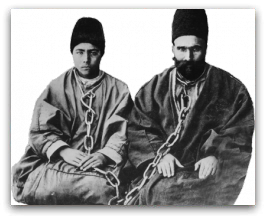Main menu
- ‘Abdu’l-Bahá’s Journey
- World Peace
- Stopping Racism in America
- Empowerment of Women
- More Principles...
- Prayer for America
Juliet: June 12 – The story of Varqa, the Martyr, related to Juliet by his son

The Master detained me for a moment. As I rejoined Percy in the car, Valiyu’llah Khan was just going into the house.
“Do you see that handsome, distinguished-looking young man?” I said. “That is Valiyu’llah Khan, a descendant of two generations of martyrs and the brother of one very young martyr. His grandfather, Sulayman Khan, was a disciple of the Báb. He was Governor of Fars and a great prince, but that didn’t save him. He suffered the most ghastly kind of martyrdom and with such ecstasy that he is one of the best beloved of the Bábi martyrs.
“Just a few years ago Valiyu’llah’s father, Varqa Khan, and his little brother, [Ruhu’llah] Varqa, went on a pilgrimage to ‘Akka and had a wonderful visit with the Master. But on their way home they were both arrested and thrown into prison. Then one day some brutal men came into their cell, one with an axe. Varqa Khan was hacked into pieces alive, and the poor little boy forced to look on at that butchery. When it was over, one of the executioners turned to the child. I think I will tell the rest in Valiyu’llah Khan’s own language, just as he told it to me.
“‘The man said to my brother: “If you will deny Bahá’u’lláh, we will take you to the court of the Shah and honours and riches will be heaped upon you.” But my brother answered: “I do not want such things.” Then the man said to him: “If you refuse to deny, we will kill you worse than your father.” “You may kill me a thousand times worse,” my brother said. “Is my life of more value than my father’s? To die for Bahá’u’lláh is my supreme desire.” This so angered the executioners that they fell upon Varqa and choked him to death. Varqa was only twelve years old.”
“A day or two ago,” I went on, “Valiyu’llah Khan asked me, ‘How is the Master’s portrait progressing?’ and he added that, in a portrait, he thought ‘one must paint the soul.’ ‘But who can paint the soul of ‘Abdu’l-Bahá?”








